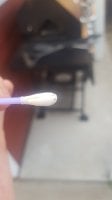UPDATE:
Starting to wonder if this is gapeworm... After dosing 4x with fenbendazole (paste on bread), symptoms appear better, but they are still there!!! Could this be something else? Predominant symptoms are now sneezing/coughing and head shaking. Still no discharge. Normal poop. Assuming it is gapeworm, should we try something other than fenbendazole? Should be increase the amount or frequency of dosing? Please help!!! We want our poor RIR to feel better (our BA seems cured), and we want eggs for breakfast! Thank you!!!
-------
After much research (both here and other online sources), we're quite sure two of our hens (black aust. and RIR) have gapeworm. (Gurgly sounds, sneezing, head shaking, stretching necks, and I saw what I think was a gapeworm in their poop, which otherwise seems normal) They had pretty much stopped laying, but now have started up again, but not as much. Also, we read that it can be caused by eating earthworms, which we fed them as treats, thinking we were being good to them! They are just over a year old (we think, we were given the hens about 2 months ago from someone who could no longer keep them in the city).
We read about treating them with Safeguard (fenbendazole). We have tried, but are unsure if we got the dosing right -- they seem to be better, but not cured. Here's what we did...
We put a BB-sized dab of fenbendazole paste on a small piece of bread and gave it to the hens. Is it okay to give it with food? Will that work? We repeated this after about a week, after only seeing mild improvement.
Then, we read that they should be dosed multiple times, so we tried it again (2 more times over about 3 days).
We've also been giving them a probiotic mash (layer pellets with milkk, yogurt, and vit E), feeding their own eggs back to them (hardboiled and mashed up with shells) since we can't eat them, and giving them cayenne pepper.
They seem to be better, but not yet 100%. What should we do next???
Thanks so much!
Starting to wonder if this is gapeworm... After dosing 4x with fenbendazole (paste on bread), symptoms appear better, but they are still there!!! Could this be something else? Predominant symptoms are now sneezing/coughing and head shaking. Still no discharge. Normal poop. Assuming it is gapeworm, should we try something other than fenbendazole? Should be increase the amount or frequency of dosing? Please help!!! We want our poor RIR to feel better (our BA seems cured), and we want eggs for breakfast! Thank you!!!
-------
After much research (both here and other online sources), we're quite sure two of our hens (black aust. and RIR) have gapeworm. (Gurgly sounds, sneezing, head shaking, stretching necks, and I saw what I think was a gapeworm in their poop, which otherwise seems normal) They had pretty much stopped laying, but now have started up again, but not as much. Also, we read that it can be caused by eating earthworms, which we fed them as treats, thinking we were being good to them! They are just over a year old (we think, we were given the hens about 2 months ago from someone who could no longer keep them in the city).
We read about treating them with Safeguard (fenbendazole). We have tried, but are unsure if we got the dosing right -- they seem to be better, but not cured. Here's what we did...
We put a BB-sized dab of fenbendazole paste on a small piece of bread and gave it to the hens. Is it okay to give it with food? Will that work? We repeated this after about a week, after only seeing mild improvement.
Then, we read that they should be dosed multiple times, so we tried it again (2 more times over about 3 days).
We've also been giving them a probiotic mash (layer pellets with milkk, yogurt, and vit E), feeding their own eggs back to them (hardboiled and mashed up with shells) since we can't eat them, and giving them cayenne pepper.
They seem to be better, but not yet 100%. What should we do next???
Thanks so much!
Last edited:




